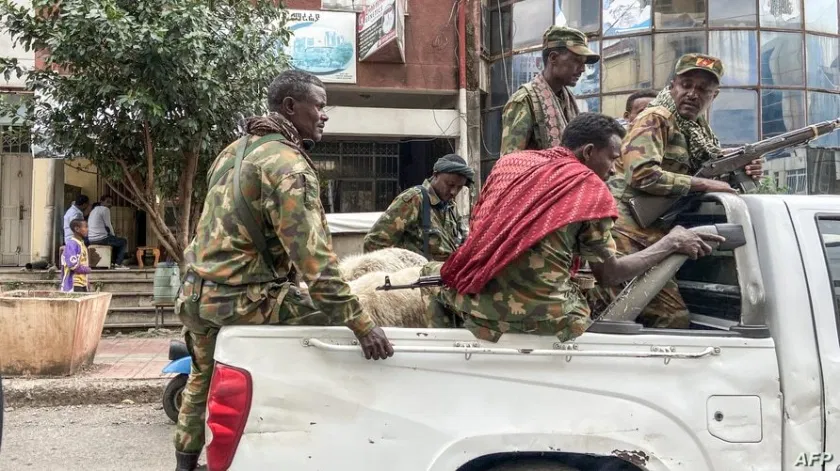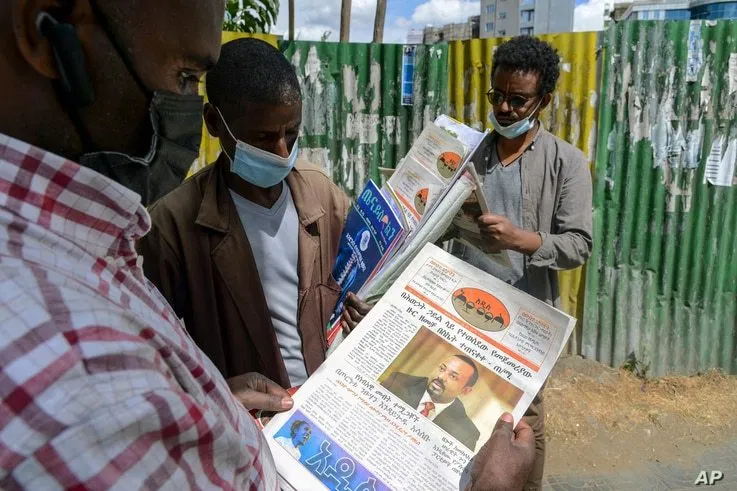“Ethiopia is the anchor state of the Horn of Africa,” said Murithi Mutiga, International Crisis Group’s Horn of Africa Project Director. “It is obviously the most populous state by far. And as one diplomat pithily put it: ‘If there was a major internal crisis within Ethiopia, it would not implode inwards. It would explode outwards.’”
Source: Voice of America
By Salem Solomon

WASHINGTON - In a country plagued by years of ethnic violence, analysts fear the latest fighting between government troops and regional paramilitary forces in Ethiopia could be the breaking point.
“We are not on the brink of civil war, Ethiopia is in the midst of a civil war,” said Kjetil Tronvoll, professor of peace and conflict studies at Bjørknes University in Oslo, Norway.
The violence occurred in Ethiopia’s northern Tigray region after fighters loyal to the Tigrayan People’s Liberation Front (TPLF), a political party, attacked a federal government position last week in what the government called an attempt to loot weapons and equipment. Prime Minister Abiy Ahmed responded by ordering airstrikes and sending in troops to put down the uprising.
Early reports say hundreds have died in the fighting. There has been an internet shutdown since the beginning of the unrest, a factor that analysts say is leading to a lack of information to assess humanitarian needs.
Tensions have been building since Sept. 9 when Tigray, the northernmost of Ethiopia’s nine regional states, defiantly held a regional election after Abiy postponed the polls, citing the COVID-19 pandemic.
Analysts are questioning whether Abiy, who called the Tigray election illegal, can keep the country together.
“The conflict between the federal authorities and TPLF might be the straw which breaks the camel’s back,” Tronvoll told VOA. “You have the potential of a serious, serious weakening of central authorities in Ethiopia. It is an extremely dire situation and I think it is very hard to see that things will return back to normality as it was before the conflict. The divisions are running too deep for that.”
The conflict also threatens to expand beyond Ethiopia’s border. The head of Sudan’s refugee agency reported this week that more than 2,500 refugees had crossed the border with hundreds more arriving daily.
There are also unconfirmed reports that Eritrea is positioning troops near the border. Ethiopia and Eritrea fought a devastating war between 1998 and 2000 and Eritrea’s President Isaias Afwerki continues to carry resentments against the TPLF which held power in the country under late Prime Minister Meles Zenawi.
Long a bedrock of stability, analysts fear a destabilized Ethiopia could spell doom for the region.
“Ethiopia is the anchor state of the Horn of Africa,” said Murithi Mutiga, International Crisis Group’s Horn of Africa Project Director. “It is obviously the most populous state by far. And as one diplomat pithily put it: ‘If there was a major internal crisis within Ethiopia, it would not implode inwards. It would explode outwards.’”
Adding to its importance, Ethiopia is one of the largest troop-contributing countries to peacekeeping missions in Africa, with soldiers stationed in Sudan, South Sudan and Somalia.
It is also an economic engine that regularly recorded GDP growth above 10% prior to the global economic slowdown caused by COVID-19.
“Ethiopia is absolutely critical to the stability of one of the most unstable regions in the whole of Africa,” Mutiga said. “Home to one of the largest contingent of peacekeepers across the world. Ethiopia’s stability is absolutely critical.”

The worries about the situation are understandable. But what commenting parties have not understood is that Ethiopia will not be destabilized due to this war. It is critically beneficial for Ethiopian government and other regions to destroy the criminal TPLF once and forever. The war is being carried out against few slits not targeting the peopletargeting the people of Tigray. Peace can only be restored when separatist TPLF terrorists are brought to court.
Are the Tigrians Ethiopians? Then, how can you bomb your own citizens and call it victory? To me the current fight is out of hatred and revenge by derg remanants that have imbeded with the current federal government of Ethiopia. The hate against Tigrians has been there for over 50 years. It did not happen yesterday. And you can’t solve it that quick. A major study is needed if the people are willing to live together as one Ethiopia. The disintegration of Ethiopia could also be a hub for terrorists.
The problem with abiy and his supporter is they are so blind so that they even can’t see themselves. What I mean when I say they are so blind: abiy and most of his front men and women are a member of the group they call “junta” a little while ago. As far as I concerned no body innocent or law abiding. They all are fraud, they changed their name to be seen as innocent people from another planet. In my recollection I never witnessed a inhumane violence in ethiopia in the past three years under abeyi watch than under TPLF In their 27 yrs rule.